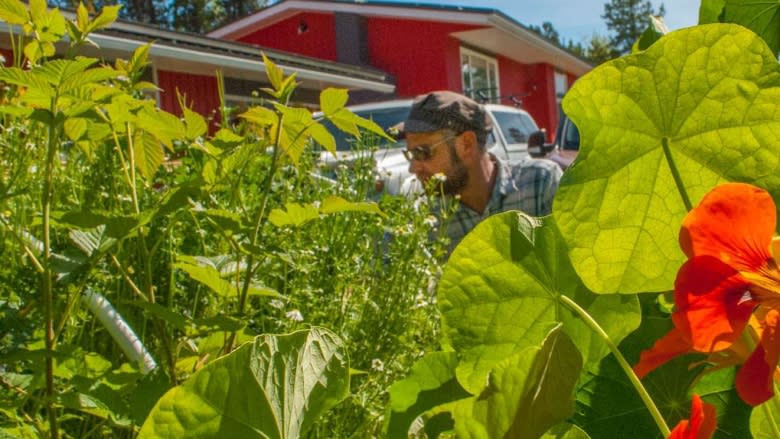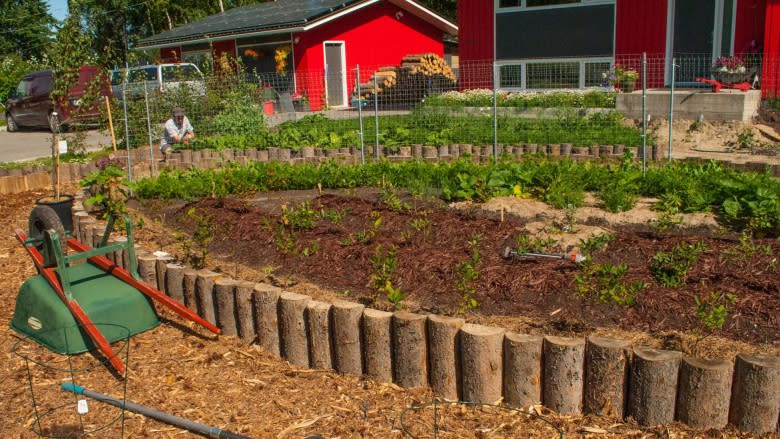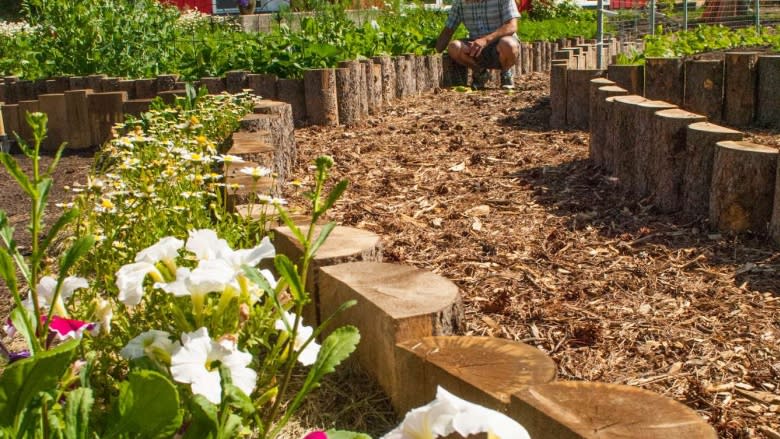'It's essential': A Yukon green thumb lowers his carbon footprint
It's hard not to notice Dustin Doerntlein's house as you drive past it in Whitehorse's Porter Creek neighbourhood.
Most of the front lawn has been converted into vegetable beds, a small orchard and berry bushes. Tomatoes and peppers are spilling out of the greenhouse in the corner.
A moose antler peeks through a compost pile, in the midst of getting a thorough cleaning from worms. A gentle hum pulses the air as the solar panels that line the house gobble up the sun's rays and supply them into the Whitehorse grid.
"We're kinda looking at it as an urban homestead," said Doerntlein, between mouthfuls of raspberries.
Doerntlein is trying to lower his carbon footprint by turning his lawn into an "edible landscape" and producing electricity.
He estimates that by season's end, the garden will have produced 700 pounds worth of food.
His solar panels are modeled to produce 17,000 kwh/year, which is roughly the average annual usage of two Yukon homes.
Doerntlein got a grant through the Yukon Government to pay for part of the installation. There are roughly 50 residential solar systems in Yukon.
Although he started gardening in 2010, it was this spring that the vegetable beds "crossed his driveway" and started to take over the rest of his property.
"My wife thinks I'm crazy," said Doerntlein with a laugh. Although he works in real estate, the garden has become an obsession. Doerntlein says he spends over 50 hours a week in it.
He doesn't sell the produce, so Doerntlein says he's been freezing, drying, canning, pickling, and giving it away.
The kitchen cupboards are overflowing with goodies and he has three freezers filled with pestos and sauces. An above-ground root cellar is planned for more storage space.
One of the more unusual plants in the garden is hops.
"I don't know anyone else in the city who is trying to grow it."
The hops should be ready for harvesting next year. Doerntlein has a friend who is a local brewer and will try turning it into beer.
The garden has become somewhat of a local attraction.
"We've lived here for eight years and this is the first year we've met the neighbours."
Food security is an important issue for Doerntlein. Living in the north, food can be precarious. Especially when most of it is shipped up on the Alaska Highway.
Occasionally the highway can close for days at a time, thereby disrupting food shipments, Doerntlein says that when it does, it's essential to be ready.
"Perhaps if the road closes for awhile we can feed the neighbourhood," said Doerntlein with a chuckle.
Doerntlein says you don't need much space to grow food, even a few potted plants can go a long way.
"I think I'll get at least 100 pounds of potatoes from there alone." Doerntlein points to a line of potted potato plants at the end of the driveway.
Compared to many regions in Canada, agricultural production in the north is low. Oats is the most common field crop in Yukon, although it's production has declined over 30 per cent since 2011.
Statistics Canada reported in 2016 that total farm numbers in the Yukon have also decreased by one per cent, however fruit farms are becoming more popular and have increased by 100 per cent since 2011.
Beside the vegetable beds at Doerntlein's home there's a large dirt pile. Doerntlein refers to it as "phase three", aka future garden expansion. But at the moment, Doerntlein has other plans.
"I'd like to get some of the local kids here to paint murals sometime soon," said Doerntlein as he poked the pile with his shoe.
He'll pay for the art supplies and the paintings will be themed around sustainability. The murals will cover the dirt, adding more colour to his already vibrant garden.




